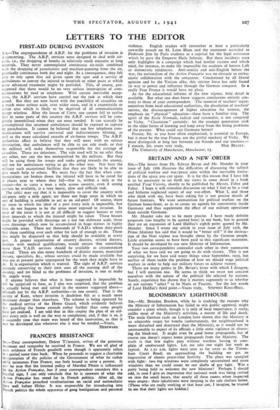FRANCE'S RESISTANCE
sa,—Your correspondent, Driver T/000000, writes of the generous tie trnent and sympathy he received in France. We are all glad of such evidence of French goodwill even though it apparently refers to s period some time back. When he proceeds to suggest a charitable int:rpretation of the policies of the Government of what he rather orkily misnames Free France, one feels bound to utter a protest. It may be true that the internal policy of Marshal Petain is influenced by the Action Francaise, but if your correspondent considers this a hopeful sign, I can only conclude that he is unaware of what the Action Francaise has stood for in French politics. After all, the Action Francaise preached totalitarianism on racial and nationalistic lines well before Hitler. It was responsible for introducing into French politics the whole apparatus of gang hooliganism and personal
violence. English readers will remember at least a particularly
cowardly assault on M. Leon Blum and the treatment accorded to Professor Jeze by Paris students as a reprisal for the legal assistance which he gave the Emperor Haile Selassie. But these incidents were only highlights in a campaign which had lowlier victims and which tried, for instance, to make life impossible for students of known Left or democratic tendencies. Anti-semitic and anti-English before the war, the nationalism of the Action Francaise was no obstacle to enthu- siastic collaboration with the conqueror. Condemned by all liberal opinion and by the Vatican alike, this sinister force has only found its way to power and influence through the German conquest. In a really Free France it would have no place.
As for the educational reforms of the new regime, little detail is available. But what one does know suggests conclusions entirely con- trary to those of your correspondent. The removal of teachers' repre- sentatives from local educational authorities, the dissolution of teachers' unions, the discouragement of higher education for women, the emphasis on " physical " education—these have a familiar ring. The spirit of the Ecole Normare, radical and rationalist, is not congenial to Vichy. "Classicism " certainly: let the younger generation stick to the older forms of learning and keep away from the biting problems of the present. What could suit Germany better?
France, Sir, as you have often emphasised, is essential to Europe, but it must be the true France, not the pitiful mockery of Vichy. We must distinguish at long last between our friends and our enemies.—


























 Previous page
Previous page